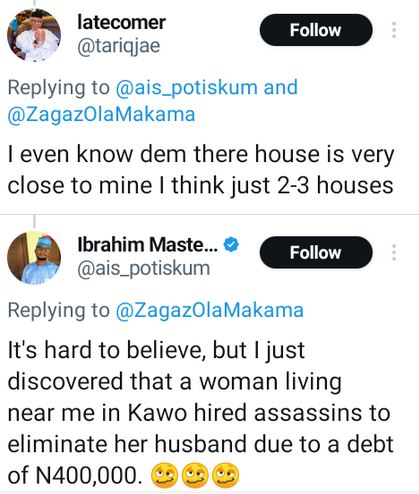
Human rights lawyer, Femi Falana, SAN, has called on the Federal Government to put an end to the reprisal attacks by soldiers of the Nigerian Army in the Okuama community of Ughelli South Local Government Area in Delta State.
Falana made this call in a statement made available to newsmen on Sunday.
Recall that some irate youths of the community reportedly ambushed soldiers who were drafted to the community to stop a communal clash in the area.
Fifteen bodies of the soldiers were recovered by soldiers of the Joint Task Force under the supervision of the General Officer Commanding 6 Division, Nigerian Army, Major General Jamal Abdussalam, at the Okuama community.
Some youths from Okoloba were said to have ambushed and killed three Okuama youths – Igho Meshack, Godspower Awusa and Okiemute Agbabuleke, over an age-long land dispute in the area as they were returning from Okwagbe.
In a reprisal attack, some Okuama youths on Wednesday reportedly ambushed one Mr. Anthony Aboh, an indigene of Okoloba, and held him hostage.
But, operatives of the JTF swiftly swung into action and moved to Okuama to rescue the hostages.
Reacting to the development, the Senior Advocate of Nigeria urged the military to halt the killings of residents while calling for a full probe of the incident.
The senior advocate had, in a statement earlier released on Saturday night, condemned the brutal killing of the soldiers. He had also called for the immediate prosecution of the suspects who were arrested for their involvement in the crime.
Falana said, “Unfortunately, some villages were attacked last night by angry soldiers. After the attack, the villages were set on fire during the nocturnal military invasion.
“Having regard to the destruction of Odi and Zaki Biam over the killing of soldiers, the authorities ought to have taken adequate measures to prevent the attack and burning of the affected villages. It is unfortunate that the Federal Government has not issued any statement on the barbaric incident.
“In view of the tragic turn of events, I call on the military authorities to halt the destruction of the properties of innocent people in the warring communities. It ought to be pointed out that collective punishment is a serious offence under domestic and international law.”
Falana further stated, “Therefore, the Delta State Government should ensure that the murder suspects and arsonists among the civilians and soldiers are fished out and prosecuted to serve as a deterrent to other criminal elements in the society.
“Once again, I commiserate with the bereaved families of the slain officers and soldiers. Since they were brutally killed in the course of duty, the Federal Government and the Delta State Government should compensate the dependants of the deceased military officers and soldiers. Compensation should also be extended to the victims of reprisal attacks by angry soldiers.”
Meanwhile, on 14th March 2024, the troops of the 181 Amphibious Batallion, Bomadi Local Government Area of Delta State, while on peace mission to Okuoma community in Delta State were surrounded by some irate community youths.
In the unprovoked attack that ensued, the Commanding Officer, 2 Majors, a Captain, and 12 Solders were reported to have been brutalised and murdered in a gruesome manner.
Reacting to the incident, Falana stated, “We join the members of the civilised humanity in condemning the brutality meted out to the military officers and soldiers as they were deployed for peace keeping mission to resolve the crisis in two warring communities in Bomadi Local Government Area of Delta state.
“We are , however, pleased to note that the military remains focused and committed to its mandate of maintaining peace and security in the country.
“Having regard to the massacre of innocent people when the military invaded Odi in Bayelsa State and Zaki Biam in Benue State in similar circumstances, we commend the military authorities for resisting the temptation to subject the two warring communities to a reprisal attack. By all means, the army should avoid a repeat of the history of having multiple tragedies.
“We have confirmed that in line with the directive of the Chief of Defence Staff, Gen Gwabim Musa, some of the gunmen involved in the heinous crime have been arrested. The Delta State Government, the respective local governments, and the leaders of two warring communities should assist the police to identify and isolate the remaining reckless murderers and unravel the motive behind the heinous crime.
“While we commiserate with the Nigerian Army and the bereaved families of the slain military officers and soldiers, we call on the Authorities of the Nigeria Police Force to ensure that a thorough investigation is conducted into the case with a view to prosecuting the suspects without any delay,” he stated.
I Have Killed Many People That I Can’t Remember Their Number – Notorious Terrorist Confesses
AFOLABI
A notorious terrorist recently arrested by vigilantes in North-Western part of Nigeria, Mohammed Dikko Radda, has said that he cannot recall the number of people he has killed.
Naija News understands that the terrorist hails from Jajjaye, a village in Katsina State.
In a video clip shared online by counterinsurgency expert and security analyst in the Lake Chad region, Zagazola Makama, the terrorist said he doesn’t look back to count numbers of casualties whenever he his shooting his victims.
“My name is Mohammed Dikko Radda, from Jajjaye village in Katsina state. I used an AK47 rifle during operations.
“Actually, I can’t remember whether I’ve killed or how many people I have killed because once I shoot, I don’t look back to see whether the victims are dead or not.
“I’ve participated in a couple of kidnap operations in about two communities. I can remember attacking Bargaji and Sabon Gari communities,” the terrorist confessed.
A Point-of-Sale (PoS) operator in Lagos State has successfully foiled a customer’s attempt to carry out a transaction using counterfeit naira notes.
The customer, identified as Linda Ihebinike, attempted to use counterfeit N1,000 notes to complete a transaction totalling N90,000. The PoS operator’s alertness played a crucial role in preventing the fraudulent activity.
Naija News reports that the State’s Police Public Relations Officer, SP Benjamin Hundeyin, shared details of the incident on his X (formerly Twitter) handle on Sunday, commending the PoS operator’s vigilance.
“A vigilant POS operator raised the alarm after a customer, Linda Ihebinike, attempted carrying out a transaction with fake N1,000 notes to the tune of N90,000. Investigation is ongoing,” Hundeyin wrote.
Hundeyin further disclosed that the Lagos State Police are currently conducting an investigation to unravel further details and possibly apprehend those behind the circulation of the counterfeit notes.
Adewale Mayowa Emmanuel, the popular Nigerian singer, who is popularly known as Mayorkun, has bemoaned the worsening economic hardship in the country.
He lamented that no aspect of the Nigerian economy is functioning properly.
The singer lamented how low the country had sunk.
On his X handle, Mayorkun wrote, “Bruh! Nothing dey work! What a place my God.”
Mayorkun is the latest celebrity to lend his voice to the public outcry for urgent economic reforms in the country.
Kaduna Police Arrest Housewife Who Allegedly Hired Assassins To Kill Her Husband Over N400k Debt
AFOLABIThe Kaduna State Police Command has nabbed and detained a housewife accused of contracting assassins to murder her husband due to a dispute over N400,000.
According to security analyst and counter-insurgency expert, Zagazola Makama, the incident occurred in Rafin Guza community in Kaduna metropolis.
“The husband borrowed his wife N400,000 to do business. One day, he demanded the money from her but she refused to give him back,” he said in a post on Saturday, March 16, 2024.
"She later decided that she should hire one gangster known as Tola and his gang to eliminate the husband so that he will stop disturbing her over his money.
Egba Onisowurun Nduoma, a 300-level Accounting student of the University of Port Harcourt, has died under mysterious circumstances.
It was gathered that Egba, who stayed in Mandela Hostel, Block B, room 201, was found dead at the Delta bus/taxi park on Friday, March 15, 2024.
The cause of the student’s death is unknown at the time of filing this report.
His remains have been deposited in the morgue.
It was further learnt that the school management and the Nigeria police have commenced an investigation into the incident.
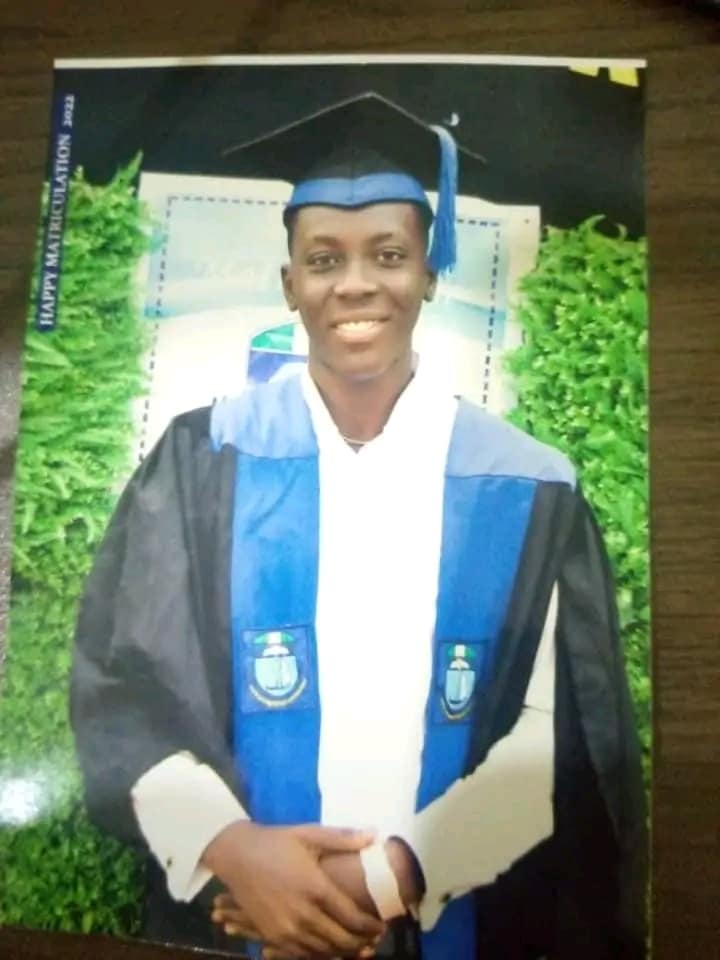
Prof. Chukwuma Soludo, the Governor of Anambra State, has disclosed that he has not taken any salary from the state since assuming office as governor two years ago.
He said that his wife does not have an official car as the first lady of Anambra State but still drives his personal cars.
The governor said this during the celebration of two years anniversary of his administration at the International Convention Center, Awka, the state capital on Sunday.
Soludo said he is deliberately executing the most austere measure government ever by cutting costs and not borrowing for the last two years.
“Any governor that comes floods you with offers for borrowing and so on and so forth, but we decided for the first two years to demonstrate something, capacity to do more with less.
“And so far as has been said, for two years, despite receiving about 25 per cent in real terms or in dollar terms of what was in the past, we have chosen deliberately not to borrow.
I have been aske severally; ‘how do you do without borrowing and with the difficult circumstances?’ And my answer is that we are doing so because we are executing the most austere measure government ever.
“As I speak to you, I am not taking any salary, I am not paid any salary by Anambra State government. Even the First Lady of Anambra don’t have any official car, she still drives my personal vehicles,” Soludo said.
The governor said that his decision to cut wastes and the cost of governance is to direct resources and prioritise them to things that are important to the people of the state.
He said his administration has prioritised areas that has been neglected in the past, building hospitals, roads schools and others in places that such amenities have never reached.
Soludo assured the people of Anambra that any kobo entrusted in his hand as the governor will be accounted for, saying that if he ever borrows, the people will be shown the projects the loan was used for and how those projects would repay the loan.
The celebration of the two years anniversary of Soludo’s administration was marked with the Pontifical Mass of Thanksgiving led by the Bishop of the Catholic Diocese of Nnewi, Most Rev. Jonas-Benson Okoye and the Bishop of the Catholic Diocese of Awka, Most Rev. Paulinus Ezeokafor.
NDLEA Arrests Hair Stylist, Dispatch Rider For Allegedly Selling Drug-Laced Chin-Chin To Students
AFOLABIAgents from the National Drug Law Enforcement Agency have apprehended a 20-year-old hair stylist named Josephine Odunu and a 30-year-old dispatch rider named Edesemi Ikporo.
They were caught selling and distributing illicit drug-laced chin-chin to school students and at social gatherings in Yenagoa, Bayelsa State.
The development was revealed by the spokesperson for the NDLEA, Femi Babafemi, in a statement on Sunday, detailing the weekly arrests of suspects and drugs seized by the anti-narcotics agency.
Babafemi noted, “NDLEA officers on patrol around the Opolo area of Yenagoa had on Sunday, March 10, 2024, intercepted the motorcycle dispatch rider, Edesemi, and recovered 200 grammes of chin-chin produced with Cannabis Sativa, which he was on a mission to deliver to a buyer.
“A swift follow-up operation led to the arrest of the hairdresser, Josephine, who distributes the drugged chin-chin from the salon where she works in the Kpansia area of Yenagoa.
“A search of the salon also led to the recovery of 3.00kg, bringing the total weight of the illicit substance seized from the duo to 3.2kg.
“Investigations reveal that they distribute the chin-chin often laced with cannabis and tramadol to students and at birthday parties. While Edesemi handles the delivery to buyers, Josephine is a major distributor to a wanted suspect who produces the drugged chin-chin.”
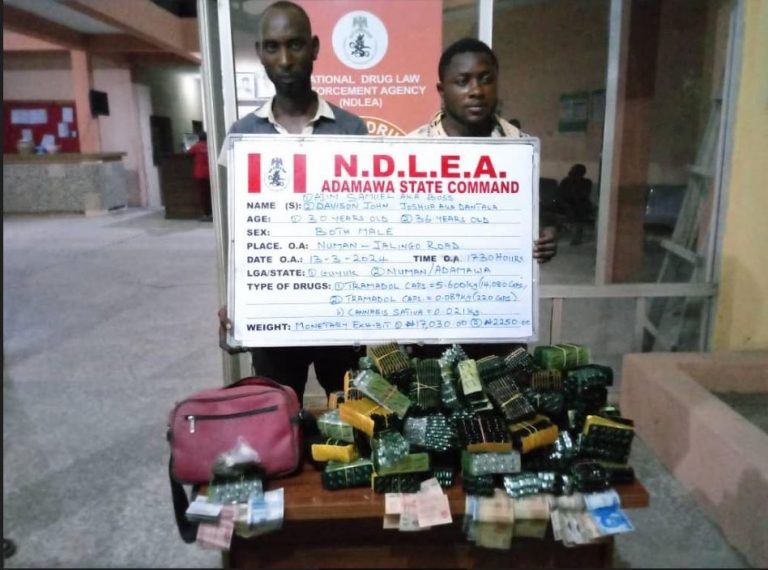
The statement further revealed that NDLEA operatives in Adamawa State on Wednesday, March 13, “arrested two wanted suspects – Ajim Samuel (aka Boss), 30, and Davidson Joshua (aka Dantala), 36, while on their way from Onitsha, Anambra State where they had gone to buy a consignment of tramadol containing 14, 428 pills of the opioid which they tucked in the body compartments of their black Honda Civic car marked YLA 623 SL.
“They were nabbed along the Numan-Jalingo road. Also recovered from them were 21 grammes of cannabis and monetary exhibits totalling N19,280.”
The spokesperson for the anti-narcotics agency added that in Osun State, “a 49-year-old commercial bus driver, Ogunleye Adegoke, was arrested along Gbongan-Ibadan road after NDLEA operatives discovered 2,000 capsules of tramadol, 60 tablets of Rohypnol and 10 bottles of codeine syrup concealed in the spare tyre compartment of his vehicle.
“Meanwhile, a total of 343,000 pills of opioids were seized by NDLEA officers from a suspect, Lawan Abubakar, 33, in Azare town, Katagum, Bauchi State on Friday, March 15, as the Nigerian Army transferred a suspect, Muhammadu Rabi’u, 37, with 64,000 pills of tramadol recovered from him to the Bauchi State command of the NDLEA on the same day.”
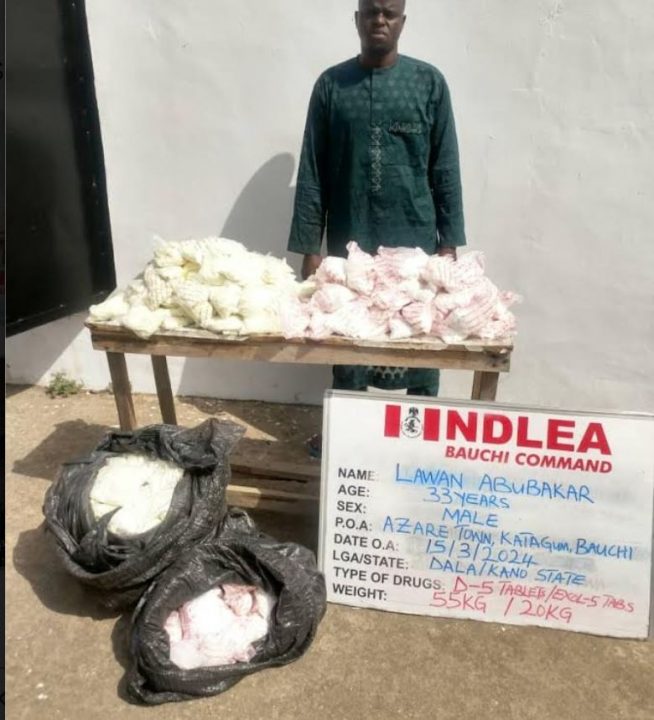
Babafemi added that “at least, 24kg of cannabis was seized from the driver of a transport company, Ikechukwu Obialo, at Sagamu Interchange, Ogun state by NDLEA operatives on Wednesday, March 13, while in Kano, two suspects: Ali Amadu, 27, and Adamu Hassan, 33, were nabbed with a total of 125.3kg cannabis; 3,400 pills of tramadol; and 30 bottles of codeine syrup.
“They were arrested on Monday, March 11, at Gadar Tamburawa area, and Friday, March 15, at Tsamiya Babba, Hotoro, respectively.”
“While 118 kilograms of cannabis were recovered from a warehouse in Masaka area of Nasarawa state on Saturday, March 16, NDLEA operatives in Edo state on Thursday, March 14, arrested a suspect, Kole Samuel, 50, with 75kg of same psychoactive substance at market area, Otuo, Owan East LGA. Same day, operatives raided the Oloma-Okpe forest in Akoko Edo LGA, where they destroyed 3,944.2075 kilograms of cannabis on 1.577683 hectares of farmland,” the statement read.
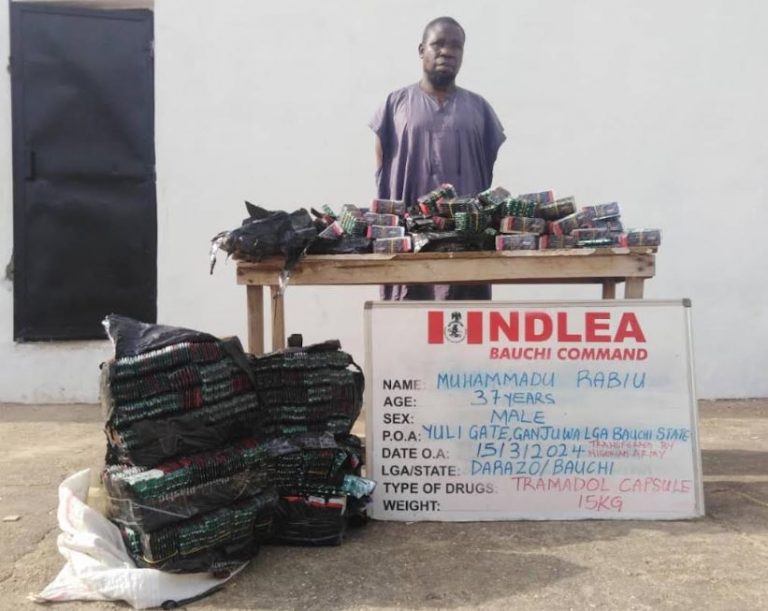
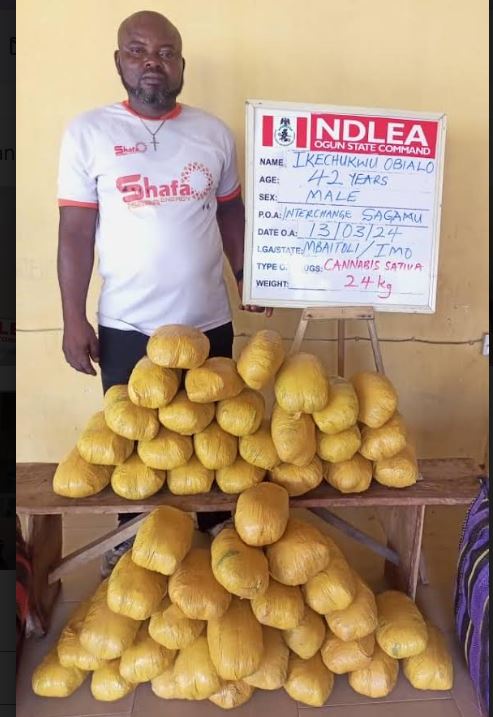
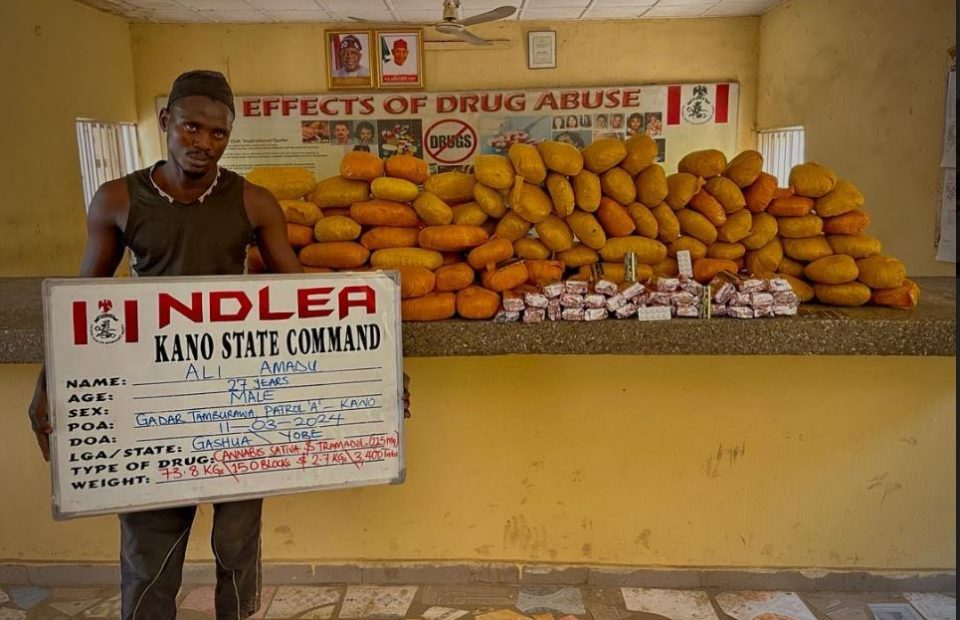
Shade Ladipo, the popular Nigerian media personality, has explained why she does not want to have children.
According to the veteran broadcaster, she will be 42 soon and never liked the idea of having kids.
She explained that she loves children but added that she does not want to be a mother.
She noted that her lack of interest in having children was not part of the reason for her divorce from her estranged husband.
The veteran TV host, however, said she is open to remarriage.
Speaking in an interview with Daddy Freeze, Ladipo said, “I am open to remarry. But I don’t want kids. I’m going to be 42 in November. I’ve never had the incline to have a child. I will be honest.
“I love children. Children love me. Children are actually attracted to me. I will go to a children party and they will start to sit around me. Children love me but I don’t have any feeling to have a child of my own. I can adopt. Maybe, adopt a whole orphanage and give them my last name. But I don’t want to.
“My decision not to have kids wasn’t an issue with my ex-husband. He was indifferent. He will have kids. But with me, it wasn’t an issue.”
The senator for Delta North senatorial district, Ned Nwoko has disclosed that he received more than N1 billion for constituency projects.
Nwoko, during a recent interview, mentioned that the allocation of resources to senators often varies based on the magnitude of their constituency projects, indicating that it’s not uncommon for some, including himself, to receive larger amounts.
This revelation comes amid the recent controversy of budget padding by Senator Abdul Ningi of the 2024 budget with an extra N3.7 trillion, a fund not tied to any extra project.
Although the Red Chamber denied any wrongdoing, some senators clarified the amount allocated for constituency projects in their districts.
Speaking on the developments, Nwoko made it clear that the allocated funds are for financing projects, not for personal reimbursement of individual senators.
“Senators get what they lobby for, not because they have the right to it. Everybody just goes about doing what they can do for their constituencies and senatorial districts.
“A better approach would have been for senatorial uniformity. So if they say that everyone should get about N1 billion, be it. But this way, you rely on your weight and contacts to see what you can get for your people.
“We are not talking about money for the senators. This is for projects within our senatorial districts. If you have road, water, or training programmes all should aggregate to a particular amount.”
When asked whether the lawmaker gets as much as N1 billion in allocation, the senator replied:
“Of course, I did. That’s why I am who I am. But these are projects for my people.
More...
Seasoned Nollywood actor and producer, Funsho Adeolu recently made some startling revelations on Teju Babyface’s podcast, accusing some of his colleagues, particularly the females of engaging in some unsavory extra-curricular activities to boost their lifestyles, and also asserting that actors who go into politics cannot be considered real actors.
According to him, “A lot of these people are not actors. An actor shall not be a politician.”
When the host, Babyface interjected, saying, “I know one who is a politician in Lagos, are you saying he is not an actor?”
Adeolu retorted, “Yes. I don’t consider him as an actor. An actor should not be in politics. If you’re an actor who is in politics you were never an actor.”
In the same vein, Adeolu queried the source of income of his female colleagues in the industry.
He averred that some actresses only come on set so they can pretend that the industry is what funds their lifestyle.
“I charge more money per movie than most Nollywood actresses but they ride bigger cars than I do. They can’t say they make all that money from acting movies to fund their lifestyles.
“People that if I collect N200,000 in a job, they can’t collect N20,000, they are riding bigger cars than I am riding
“What they do is come on set, show themselves on TV, so they have the opportunity to..,” he said without finishing the sentence.
Funsho Adeolu was born in 1968 and has been in the movie industry for decades.
Media
Budget padding: Refer allegations to EFCC, ICPC, reinstate whistleblower Ningi - SERAP tells Akpabio
AFOLABISocio-Economic Rights and Accountability Project (SERAP) has urged the Senate President Mr Godswill Akpabio to “urgently refer the allegations that lawmakers padded the 2024 budget by irregularly inserting projects worth N3.7 trillion to appropriate anti-corruption agencies for investigation and prosecution.”
SERAP urged him “to immediately reinstate whistleblower Abdul Ningi who was recently suspended from the Senate over his allegations that the lawmakers padded the 2024 budget by irregularly inserting projects worth N3.7 trillion.”
SERAP also urged him “to make a public commitment to discontinue the patently unlawful constituency projects in the next budget cycle.”
In the letter dated 16 March 2024 and signed by SERAP deputy director Kolawole Oluwadare, the organisation said: “Referring these allegations to appropriate anticorruption agencies would be consistent with the lawmakers’ oath of office and the letter and spirit of the Nigerian Constitution 1999 [as amended].”
SERAP said, “What Senator Ningi has done is a positive act of good citizenship. No whistleblower should ever be penalised simply for making a public interest disclosure.”
The letter, read in part: “Without inside information, corruption is hard to detect, prevent and combat. Rather than suspending Senator Ningi, the Senate ought to have used his allegations as a trigger for addressing the lingering problem of budget padding and corruption in the implementation of constituency projects.”
“Referring the allegations to the Independent Corrupt Practices and Other Related Offences Commission (ICPC) and Economic and Financial Crimes Commission (EFCC) would improve public trust in the ability of the leadership of the Senate to ensure probity and accountability in the budget process.”
“We would be grateful if the recommended measures are taken within 7 days of the receipt and/or publication of this letter. If we have not heard from you by then, SERAP shall consider appropriate legal actions to compel you and the Senate to comply with our requests in the public interest.”
“By exercising strong and effective leadership in this matter, the National Assembly can show Nigerians that the legislative body is a proper and accountable watchdog that represents and protects the public interest, and is able to hold itself to account in the management of public resources.”
“Encouraging whistleblowers to speak up improves public services and strengthens public accountability. Promptly referring the allegations to the Independent Corrupt Practices and Other Related Offences Commission (ICPC) and Economic and Financial Crimes Commission (EFCC) for investigations and prosecution would serve the public interest.”
“Investigating and prosecuting the allegations of budget padding and corruption would end the impunity of perpetrators. It would improve transparency and accountability in the National Assembly, and build trust in democratic institutions with the ultimate aim of strengthening the rule of law.”
“SERAP is concerned about the opacity and lack of accountability in the spending of public funds on constituency projects since the return of democracy in 1999.”
“SERAP is seriously concerned that years of allegations of budget padding and corruption in the implementation of constituency projects have contributed to widespread poverty, underdevelopment and lack of access to public goods and services.”
“Allegations of budget padding and corruption in the implementation of constituency projects have also continued to have negative impacts on the fundamental interests of the citizens in several communities and the public interest.”
“SERAP is concerned that despite the country’s enormous oil wealth, ordinary Nigerians have derived very little benefit from the budget primarily because of budget padding and corruption in the implementation of constituency projects and the entrenched culture of impunity of perpetrators.”
“Combating budget padding and discontinuing constituency projects would serve the public interest, improve access of Nigerians to basic public goods and services, and enhance the ability of ministries, departments and agencies to effectively and efficiently discharge their constitutional and statutory responsibilities.”
“SERAP notes that Section 15(5) of the Nigerian Constitution requires public institutions to abolish all corrupt practices and abuse of power.”
“Section 16(2) of the Nigerian Constitution further provides that, ‘the material resources of the nation are harnessed and distributed as best as possible to serve the common good.’”
“Section 13 of the Nigerian Constitution imposes clear responsibility on the National Assembly including the Senate to conform to, observe and apply the provisions of Chapter 2 of the constitution.”
“Section 81 of the Nigerian Constitution and sections 13 and 18 Fiscal Responsibility Act constrain the ability of the National Assembly to unilaterally insert its own allocations in the budget without following the due process of law.”
“Nigeria has made legally binding commitments under the UN Convention against Corruption to ensure accountability in the management of public resources.”
“Articles 5 and 9 of the UN Convention against Corruption also impose legal obligations on the National Assembly including the Senate to ensure proper management of public affairs and public funds.”
“Article 33 of the Convention requires government institutions including the Senate to ensure the protection of whistleblowers against any unjustified treatment. These commitments ought to be fully upheld and respected.”
“The National Assembly has a constitutional responsibility to combat corruption, waste and abuse in its own spending if it is to effectively exercise its oversight functions and hold the government to account.”
“It is a travesty and a fundamental breach of their fiduciary duties for members of the National Assembly to arbitrarily increase their own budget and to use the national budget as a tool to satisfy the lifestyle of lawmakers, and for personal gain.”
“SERAP also urges you to put in place transparency and accountability mechanisms to ensure that the trillions of naira budgeted for constituency projects are not embezzled, misappropriated or diverted into private pockets.”
“Lawmakers should feel safe to freely raise public interest concerns, just as Senator Ningi has done in disclosing information on alleged budget padding and corruption in the Senate.”
“Senator Ningi is a whistleblower, who is protected under article 33 of the UN Convention against Corruption to which Nigeria is a state party. Senator Ningi is a whistleblower because of his public interest disclosures on alleged budget padding and corruption in the Senate in the context of carrying out his work as Senator.”
“He is entitled to raise concerns about allegations of budget padding in the National Assembly to address the negative effects of corruption on access of millions of Nigerians to basic public goods and services and enjoyment of human rights.”
“The allegations by Senator Ningi amount to public interest disclosures and can contribute to strengthening transparency and democratic accountability in the Senate in particular and the country as a whole.”
“Suspension of Senator Ningi by the Senate followed a seriously flawed process and it amounts to retaliation. Senator Ningi’s status as a whistleblower is not diminished even if the perceived threat to the public interest has not materialised, since he would seem to have reasonable grounds to believe in the accuracy of the allegations of budget padding and corruption in the Senate.”
“SERAP notes that freedom of expression is a constitutional and internationally recognized human right in Nigeria, and the country has enacted the Freedom of Information Act which grants Nigerians the right to seek and receive information such as the information about budget padding being disclosed by Senator Ningi.”
“Whistleblowing is a fundamental aspect of freedom of expression and freedom of conscience and is important in tackling gross mismanagement of Nigeria’s commonwealth. Whistleblowing can act as an early warning to prevent damage as well as detect wrongdoing that may otherwise remain hidden.”
“According to our information, Senator Abdul Ningi Mr Ningi, the Chairperson of the Northern Senators Forum (NSF), recently told BBC Hausa that the lawmakers sought the service of a private auditor and discovered irregularities in the budget.”
“Senator Ningi reportedly said, ‘For example, we had a budget of N28 trillion but after our thorough checks, we found out that it was a budget of N25 trillion. How and where did we get the additional N3 trillion from, what are we spending it for?.’”
“According to BudgIT, a total of 7,447 projects culminating in N2.24tn were indiscriminately inserted in the 2024 budget by the National Assembly. 281 projects worth N491bn, and 3,706 projects within the range of N100–500m, worth 759bn were inserted in the budget.”
Fate is an intricate decider of human life. So it was with an Enugu-based lawyer, Ellias Ugwu, 60, who went to rescue his kidnapped cousin in Kogi State, last week. His cousin, Alexander Ugwu, 53, a businessman at Akpanya, Benue State, was going back to his base in a commercial bus when they encountered heavily armed Fulani herdsmen who blocked the highway while kidnapping.
His abductors later called demanding N10m. Though the ransom was later reduced to N4m, the lot fell on the Nsukka legal luminary to move into the bush and rescue Alexander. This, he succeeded in doing after engaging another of his friend, to accompany him to the den of the kidnappers.
Tragically, as they were joyously returning home, calling friends and family members to share their joy, their excitement was cut short and turned into sorrow. A team of policemen who were on the trail of bandits that earlier raided some police stations and banks at Anyigba, a nearby town, accosted them and the legal practitioner who was driving his car was shot dead. Alexander, the kidnapped victim, who was at the back of the car when his uncle’s life was cut short, in this interview, gave vivid details of how the heart-wrenching incident happened. Excerpts:
How I was captured
“To commence my travel from Iheakpu-oka village to Anyigba on March 2, 2024, I boarded a vehicle going to Ejule from an Army checkpoint situated between Aloma and Ejule. Precisely, the village called Iboko. While on our way, we encountered heavily armed herdsmen who were stopping vehicles, shooting and kidnapping people.
They kidnapped everyone in the car (six persons), including the driver. And we were all taken into the bush. The incident happened around 6:20 PM that Saturday, and I was there till Monday morning when they began to request for ransom.
Ransom
Before my phone went off, the first relation that I could speak to over the phone was my cousin, Elias Ugwu, whose father is my father’s elder brother. I called him and told him the kidnappers were requesting for N10 million because, according to them, once an individual is from the Eastern part of the country, he or she must be wealthy.
I explained to them that I didn’t have money. They countered, saying if I didn’t have money, my relatives had.
Meanwhile, they collected a ransom of N130,000 from the driver’s family. Also, they collected N200,000 as ransom from the family of a first-year student at Kogi State University, KSU, who is from Ogugu, in Kogi State.
Shocked by the ransom that they (driver and student) were asked to pay, I asked why my case was different.
However, If anyone talked, they would beat the hell out of the person. They later reduced my ransom to N4million. I was given the privilege to communicate the ransom to my uncle, who informed all my relatives including Iheakpuoka community in Anyigba about their demand. When the money was finally raised, the kidnappers asked them to bring the ransom before they could rescue me.
Though my uncle was to come on Friday to pay the ransom and rescue me, he couldn’t make it. But when my captors finally called him at around 5 pm, he said he was at Ejule. The kidnappers then told him what to buy for them. They told him to buy Nkpurummiri (hard drug), water and N10,000 pack of energy drinks.
Around 7 pm on Friday, they called him, and he said he couldn’t come to Aloma at that time because he was not only old to embark on such journey at that time, he was also afraid. They, however, told him to sleep somewhere that they would tell him when and where to bring the ransom and the items the next day.
On Saturday morning, 9th of March, we started communicating with my uncle unknown to us that there was a bank robbery on Thursday in Anyigba, and this (his release) was happening on Saturday morning.
Rescue effort
So, the villagers who saw my uncle and his friend who were coming to rescue me, driving around, were the ones who called the police informing them that there is a vehicle that is roaming around the community through an escape road behind the university.
So, the policemen came and laid ambush. They parked their vehicle in the bush close to the road. When we were coming back, we saw a police vehicle packed distantly and we were happily approaching the vehicle. The next thing we heard was ‘stop’ and then the sound of gunshots and my brother was hit on his head. He lost control, so the vehicle veered into the bush. That was when one of the security people said they were police officers. I used a cloth to tie my uncle’s head because he was bleeding profusely. They tried to pull out the vehicle, but we could not. The police then used something to attach it to their Hilux to pull out the vehicle.
We already told them who we were, but it was already too late. They had finished searching the vehicle expecting to see a huge sum of money. The kind of clothes I wore made them realise that I was a victim of kidnap, they became tired. They took us to Maria Goretti Hospital in Anyigba.
Worried by the endemic cases of sexual and gender-based violence traced to unlawful marriages known in the local parlance as ‘aure leather’ the Gyel district of Jos South local government area of Plateau State has taken the lead in reducing the number of items required for the traditional marriage rite to enable young men to afford the cost and get married legally.
The gesture is also to give women the pride of place in their respective homes and ensure that disagreement over nonpayment of dowry does not degenerate into violence in the homes.
This is as a call is made for the curbing of indiscriminate mining which is said to contribute to the prevalence of alcoholism and sexual and gender-based violence in communities.
Speaking during a panel discussion organized by the Women’s Rights Advancement and Protection, WRAPA in commemoration of 2024 International Women’s Day for stakeholders from the Berom tribe in the State, the District Head of Gyel (a Berom enclave), Da Nga Dangyang through his Secretary, Rwas Jonathan pointed out ways that women inclusion are ensured in their community saying there is a bye law to ensure enforcement.
He said “The Gyel Traditional Council has developed a bye-law which gives women the opportunity to be in the traditional council, determine the type of punishments given to anyone who is involved in any form of violence, spells out ways to mitigate insecurity.
“The Council has reduced bride price to N30,000 because it was discovered the high rate of the bride prices were the cause of unlawful marriages and the reduction has swelled up the number of legitimate marriages in the District. The bye-law also says women who don’t work should be given a percentage of their husband’s salary.”
A Berom elder, Da Dauda Gyemang insisted that the rich culture of the Berom nation especially on family life is being eroded by indiscriminate mining activities which make very young people get quick money to indulge in alcoholism and early marriages.
His words, “One major activity going on on the Plateau now is illegal mining and very young people drop out of schools to engage in it. They get quick money without the capacity to utilize the money. They go into drinking and begin to cohabit in the name of marriage. This is very risky, some parents are even encouraging their children not to go to school but to go for this mining at the age of 10; 15 years, many of them go into drinking and marriage.
“So, as a man, he is always drunk and cannot even perform his duties as a man and when the girls don’t get the satisfaction they desire from their men, they get along with the available person that can meet their needs. When a man cannot perform and he sees his wife is not faithful, he vents the annoyance in the form of beating and other forms of violence.
“We have been advocating for organized mining with financial literacy so that the youths can be guided on how to make use of their money and even pay taxes to the government. When this is done, the rights of the men and the women would be protected as this organization is advocating.”
Earlier, the panellists, Dr Dachollom Jambol (Chairman of Berom Elders Forum), the Gwom Rim (Chief of Rim), HRH Gyang Dahoro, President of Berom Educational and Cultural Organisation, BECO, Da Gyang Dudu, President of Berom Youth Moulders Association, BYM, Barrister Solomon Mwantiri, and Chairman of Berom Districts Development Association, Da Silas Pwajok, moderated by Mr Steve Aluko denounced all forms of SGBV saying they are strange to the Berom culture.
The speakers commended the Gyel District for the initiative and reiterated that the Berom culture does not encourage domestic violence as there were laid down rules to checkmate such but blamed the negative impacts of civilization which alienate parental and community inputs in the choice of marriage partners and called for mentorship and discipline in society.
The State Coordinator of WRAPA, Mrs. Jummai Madaki noted that the event aimed at promoting women’s inclusion as a fundamental right and a smart approach that supports inclusive communities as a catalyst to development and has as its goal, the encouragement of men and boys to become key allies and actors in the fight against SGBV through community-based dialogue in a panel format.
In his remarks, Nanle Gujor, the Secretary of Plateau Initiative for Development and Advancement of the Natives, PIDAN, the umbrella body of all the indigenous Development Associations in the State, said the rest of the tribes and native Associations should emulate the Gyel District and reduce exorbitant bride prices. Rev. Christopher Damsher asked that religion and culture collaborate to find a balance in curbing SGBV.
Meanwhile, participants including people living with disabilities, the youths, women, and others condemned violence against women and girls, agreed to replicate the Gyel District bye-law in the whole of Berom land, asked that harmful traditional practices be abolished, and called for the upholding of traditional practices that promote community wellbeing.

